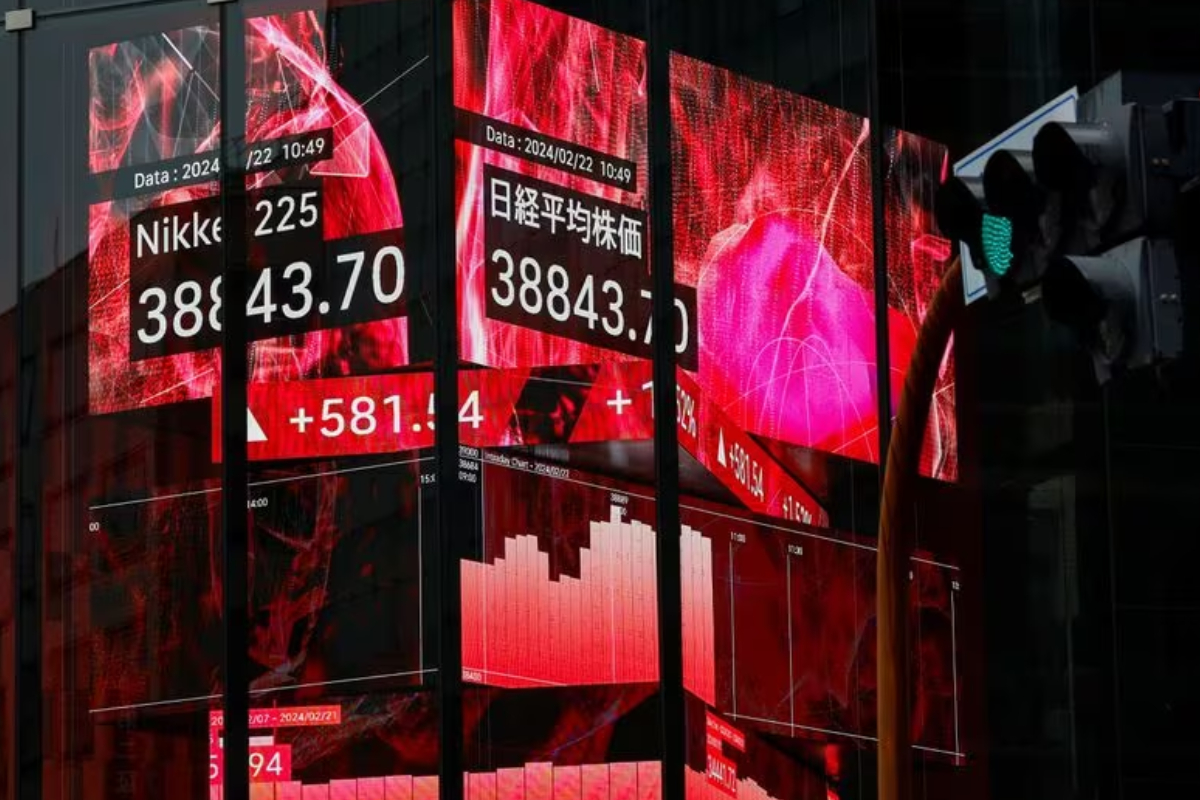TOKYO: Japanese stocks raced to a record peak on Thursday, breaking levels last seen in 1989 during the halcyon days of the bubble economy, as cheap valuations and corporate reforms lure foreign money looking for alternatives to battered Chinese markets.
The Nikkei share average rose as high as 39,156.97 points, above the previous intraday all-time peak of 38,957.44 points touched on the final trading day of 1989. On that day, the benchmark index closed at 38,915.87 while on Thursday the Nikkei finished 2.19% higher at 39,098.68.
The 34 years it has taken to regain its footing is a record, too, for a major market and is a decade longer than Wall Street took to recoup losses from the 1929 crash and Great Depression.
The index is up almost 17% this year after surging 28% in 2023, when it was the best performing Asian major bourse. The tech-heavy Nasdaq, by comparison, soared 43% last year and is up 6% so far in 2024.
Around 20 traders at brokerage Nomura’s Tokyo trading floor were on their feet moments after afternoon trading opened as the Nikkei broke through its 1989 high. Some clapped while others let out muted cheers alongside a lone “bravo”.
More animated cheers and prolonged applause had broken out in the morning session when the benchmark index broke out above its previous all-time closing high of 38,915.
The Nikkei’s rally has defied a recession in Japan, wars in Europe and the Middle East, a global inflation shock and rising rates worldwide. Trade exposure has helped insulate it from deteriorating domestic demand while a weak currency has boosted exporters’ earnings. The milestone also finally draws a line under decades of lacklustre performance that had kept global investors away.
Corporate governance changes in Japan are driving buybacks and unwinding cross-holdings, and foreigners are now spurring the rally with the likes of large investment from Warren Buffett in 2020 putting the spotlight on attractive valuations.
Foreign investors poured in 6.3 trillion yen ($42 billion) in the equity market last year. They spent a net 1.16 trillion yen in Japanese equities in January.
A robust earnings season and a falling yen , which is back near 150 per dollar level, as well as expectations that the Bank of Japan will stick with ultra-easy monetary policy for a while yet have supercharged the market at the start of 2024.
The Nikkei’s lofty heights recall the boom years of the 1980s and memories of the collapse in the market and other assets that ushered in deflation and Japan’s “lost decade,” scarring a generation of investors.
Fast-forward three decades later, there is far less froth now and no portents of an imminent crisis with inflation running at just above 2% and corporate earnings booming even though the economy slipped into recession at the end of last year.
Uniqlo-owner Fast Retailing chip tester Advantest Corp and chip tool maker Tokyo Electron are some of the firms behind the rally, compared to banking and real estate stocks three decades ago.
Japanese stocks’ forward price-to-earnings ratio, a common metric of valuation, went north of 50 in the bubble era, and is currently at 20.5 for the Nikkei, compared with 25 for Nasdaq and 20.4 for S&P 500 index, according to Refinitiv data.
Japan’s market has also been aided by a strong corporate reform push from the bourse itself and by fortuitous timing of its performance – it has been gaining while China has been tanking.
Allocators say at least some of that is finding its way to Japan, where global funds have been below market weight for years while US and Chinese stocks had done so well.
To be sure, a weak yen has eaten away at returns in dollar terms and investors are nervous about sudden moves in the currency in either direction as Japan tries to plot a path out of its deflation slump and negative interest rates.
But steps last year by the Tokyo Stock Exchange to push companies with underperforming stocks improve use of capital has investor fundamentals improving, with record share buybacks as well as unwinding of unproductive cross-shareholdings.
Nearly half of the companies on the TSE’s prime section have responded to a call to disclose plans to improve capital efficiency, the bourse said last month, as it released for the first time a list of those who had complied.
Investors say a corporate cash pile – which stood at 555 trillion yen in 2022 – could pay for plenty more buybacks, while households’ hoard of 2.1 quadrillion yen in cash could also drive price gains were momentum to pull it into the market.


